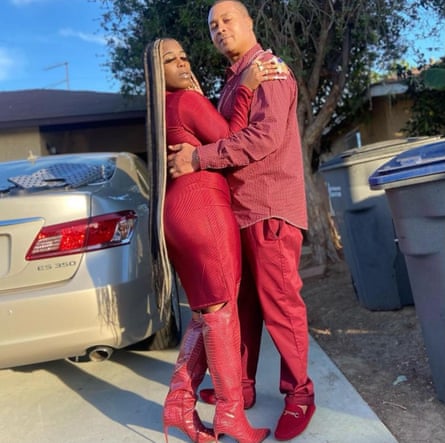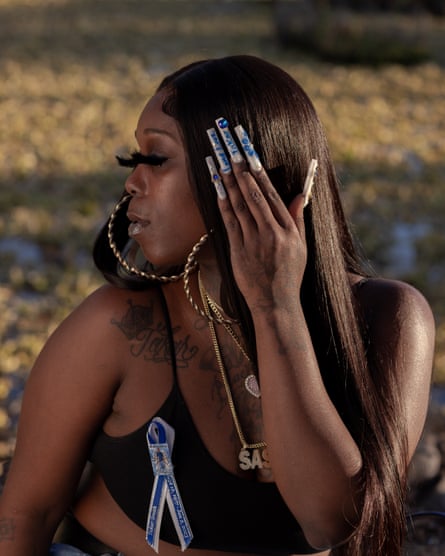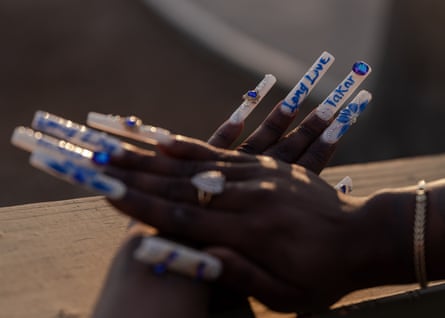Guardian vertical image template
Sassie Smith had run out of options.
"On 2 January, her husband, Takar Smith, was talking to himself and making nonsensical remarks, a sign he was having another episode of schizophrenia, which had long strained their relationship. She was scared and wanted him to get treatment in a facility, so she walked a few blocks to a nearby Los Angeles police station for help.
Soon after, at least six armed officers entered her apartment where Takar, 45, was alone, unarmed and paranoid. Fifteen minutes later, while he was cornered in the kitchen, on his knees and now with a knife in his hand, two officers shot him, causing him to instantly collapse facedown. They handcuffed his motionless body. Takar was pronounced dead at the scene.
“I never would’ve gone to the police if I knew that could happen,” Sassie Smith said one month after the killing and two days after she buried her husband. “I really wish I could go back to that day. I’ve been trying to figure out how I can change this situation. But I can’t. I don’t know how I’m going to go on with my life, I don’t know how I’m going to make it.”
Takar, a father of six, was one of three people killed in encounters with LAPD last month, in a case that rattled Los Angeles, but quickly faded from the news a week later as word spread of Memphis police’s fatal beating of Tyre Nichols. While Takar’s killing did not spark national protests, advocates said the circumstances of his death illustrated deeply rooted problems with policing and mental health care in the US, where desperate families seeking help for relatives in crisis are regularly met with armed agents who respond with arrests, violence and deadly force.
While Takar’s family is just beginning their fight for justice, they say he was let down by the system long before two officers shot him.
‘He showed me what love is’
Since Takar’s death, Sassie has been celebrating him every way she can. On a recent sunny afternoon, she arrived at an interview with “Long Live Takar” painted on her fingernails and plastered in all caps on her sneakers, and a small pin featuring his photo adorned with angel wings.
“I loved that man so fucking much. He was everything to me,” the 31-year-old said. “I won’t let this get swept under the rug, and I will keep his name alive.”
Sassie was 19 years old when she met Takar in 2010 at a public housing complex where they both lived. They spotted each other and had an instant connection, she said. After a first date at the beach, they became inseparable, Sassie said: “He taught me about LA. He taught me to stop disrespecting my mom. And he made me feel safe. He showed me what love is and how to love myself.”
Takar worked at an oil refinery, and the two eventually had three children together, the five of them sharing a one-bedroom apartment in Westlake, just east of downtown.

He first began showing signs of mental illness in 2015, Sassie said. Takar started talking to himself, saying voices were coming from the couch and heater, and covering up the TV and windows with paper because he thought they were being watched. She took him to a mental health clinic, and Takar was eventually institutionalized, Sassie said.
He started to get better, but did not consistently take medications and continued to struggle with delusions, causing significant challenges in their marriage. Authorities eventually put a restraining order on him to stay away from his wife. On the day she walked to the police station to seek help, officers printed out a copy of the order, told her to return to her apartment, call a non-emergency line and show it to police when they arrived.
In audio released of that call, Sassie reiterated his schizophrenia diagnosis and the need for him to be taken to a facility, asking the dispatcher if she could look up his past placements and saying he was off his medication and “not in his right mind”. She told the officers who arrived that he had no weapon, but noted there was a knife in the kitchen.
The officers told her to wait outside as they entered the building.
‘Don’t hurt my husband’
Bodycam footage released by the department showed officers ordering Takar to come out; when he asked if he could put his shoes on, the officers told him to “relax” and exit without his shoes. Within less than a minute, one officer issued his first threat, saying: “If you hurt us right now, I’m letting you know you will get Tased.”
Takar responded in disbelief to the threat: “‘If you hurt us right–?’ Tased?” He grew increasingly distressed and scared as more officers arrived and at one point picked up a chair, prompting an officer to say: “That chair can hurt people,” with two of them then pointing their Tasers at him, the devices’ laser targets visible on his shirt. When Takar said: “Let me out,” the officers told him again he needed to leave without his shoes.
Over the next 12 minutes, interspersed with nonsensical statements, Takar also pleaded with the officers, saying: “Talk like a human to me,” “Put the fucking gun down,” “I’m not the threat” and “You know I’m not your enemy.” When Takar entered the kitchen to pour himself a glass of water, the officers started shouting at each other, noting that there was a knife on the counter, and with one saying: “I’ll be lethal.” At one point, an officer yelled: “Stop playing childish games.”
When Takar moved a bicycle in front of himself, officers started Tasing him, at which point Takar picked up a knife from the counter, prompting multiple officers to scream: “Knife! Knife!” While Takar was knocked down on the floor from the Tasing, two officers fired seven bullets at him. As he remained lifeless, multiple officers kept their guns trained on him for several minutes and warned each other that he still had the knife, with one saying: “Let’s get him in cuffs.”
Outside, Sassie was growing increasingly concerned it was taking so long for police to bring him out and ended up running in the building where she said officers grabbed her. “I was screaming: ‘Don’t hurt my husband.’” When she heard the gunshots, she cried for them to get an ambulance, she said, “But they were holding me down and I was going crazy.”

Raischard Smith, Takar’s older brother, noted that police never explained why they were at his door, and that Takar was likely confused and disturbed by their presence.
“I watched the police murder my brother. He was on his knees, facing the kitchen counter, with two bikes in between him and the officers. How can he be a threat to anybody?” said Raischard, 48, also noting that his movements in his final moments came as he was being Tased. “How can we keep paying police to kill innocent citizens, people with mental problems? This could be anyone’s kid, mother, brother, sister.”
LAPD chief Michel Moore, facing increasing scrutiny for three killings in a four-day period, told reporters he was concerned that no officers involved called the department’s mental health unit, which is supposed to assist in these cases, and he said: “I also have concerns regarding the final moments leading up to the shooting.”
But he defended LAPD’s record, saying: “We’re a leading agency in the growth and development in mental health training.”
LAPD declined to comment on the case and did not respond to requests for an interview about its policies. Debbie Thomas, director of the LA police union, defended the killing, saying she believed there was no other way the situation could’ve been handled: “I am fully standing behind the officers, I think they were the epitome of de-escalation … The way these officers reacted was exactly how they were trained to react.”
‘Preventable’ deaths
Police across the US killed at least 109 people during mental health and welfare checks last year, according to Mapping Police Violence, and research has estimated that people with mental illnesses are 16 times more likely to be killed by police, making up 25-50% of victims. A third of people shot by LAPD were reported to have mental illnesses, the Los Angeles Times reported in 2021.
“This was another loss of life that was preventable,” said LA city councilmember Eunisses Hernandez, a former community organizer who won her seat advocating for abolition and the defunding of police and reinvestment in services. “I’m angry because our bureaucracies and governments keep failing in building out the programs that would prevent people from falling into crisis, and allow people who have dedicated their careers to mental health to be the ones responding to those who are in crisis.”
All three LAPD victims this year showed signs of mental illness or distress, she said: “But none of them were even given time for law enforcement to see their humanity.”
Hernandez noted that LA county has a psychiatric mobile response team that is separate from law enforcement, but that these types of programs are significantly underfunded, especially compared to police budgets. She said she would be pushing for these services to be scaled up and cited models in Denver and Portland.
“What keeps us safe is investing in families,” said Sylvester Ani, an activist working with Takar’s family. “We have the money to do it, but we put it into the police instead of mental health support and ending poverty.”

Cat Brooks, executive director of the Anti Police-Terror Project, which assists families of people killed by police in California, noted how the mere presence of police can escalate a mental health episode: “Law enforcement is trained to subdue, control and subjugate. And someone who is not necessarily sharing our reality or is in an elevated emotional state often cannot even process what an officer is saying, particularly if they’re shouting [many] commands in seconds.”
Brooks’s group published a guide last year on how communities can respond to intimate partner conflicts without involving police; she said cities need response teams that are entirely divorced from police, noting how Takar’s wife called a non-emergency number about a mental health issue and was met with a traditional armed response.
She also noted that family members who call 911 for help and then see their loved one killed often face crippling guilt: “The state doesn’t take responsibility, and it can tear families apart.”
‘My babies have questions’
Sassie is now moving out of the apartment where she lived for 10 years and where her husband took his final breath. She’s still figuring out how to process the loss with their three children, who are ages eight, nine and 10: “My soul hurts for my babies. They want to know why police did that. They’ve got a lot of questions, and I can’t give them answers, because I have the same questions.”

She said she wanted Takar, whose nickname was Lil Fish, to be remembered as the man who took care of her and taught her how to raise children, who loved to sing and who cooked chicken tacos on Tuesdays.
Raischard said he wanted to see the officers fired and prosecuted, and for his brother to be celebrated as the family man who adored his children.
Sassie hopes to raise money for programs that could assist people with mental illness; she wished Takar had had a regular social worker who was monitoring his progress and who she could have contacted that day.
“I called police for help because I had nobody else to call,” she said."
No comments:
Post a Comment